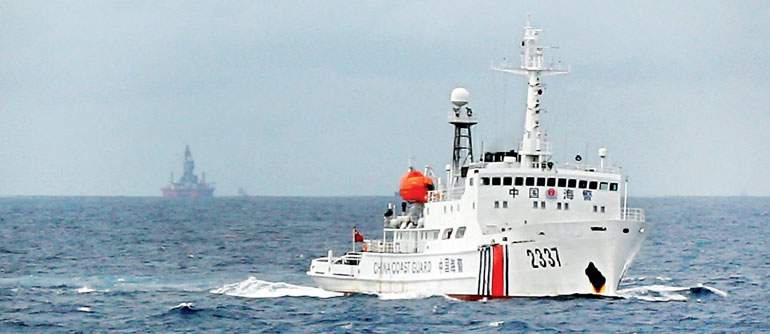Monday Feb 23, 2026
Monday Feb 23, 2026
Wednesday, 6 July 2016 00:00 - - {{hitsCtrl.values.hits}}

A Chinese Coast Guard vessel (R) passes near the Chinese oil rig, Haiyang Shi You 981 (L) in the South China Sea 13 June 2014 – Reuters
Reuters: China should prepare itself for military confrontation in the South China Sea, an influential Chinese paper said on Tuesday, a week ahead of a decision by an international court on a dispute there between China and the Philippines.
Tensions have been rising ahead of a July 12 ruling by an arbitration court hearing the argument between China and the Philippines over the South China Sea in the Dutch city of The Hague.
In joint editorials in its Chinese and English editions, the state-run Global Times said the dispute, having already been complicated by U.S. intervention, now faces further escalation due to the threat posed by the tribunal to China’s sovereignty.
“Washington has deployed two carrier battle groups around the South China Sea, and it wants to send a signal by flexing its muscles: As the biggest powerhouse in the region, it awaits China’s obedience,” it said.
China should speed up developing its military deterrence abilities, the paper added.
“Even though China cannot keep up with the U.S. militarily in the short-term, it should be able to let the U.S. pay a cost it cannot stand if it intervenes in the South China Sea dispute by force,” it said.
“China hopes disputes can be resolved by talks, but it must be prepared for any military confrontation. This is common sense in international relations.”
The newspaper is published by the ruling Communist Party’s official People’s Daily, and while it is widely read in policy-making circles it does not have the same mouthpiece function as its parent.
China, which has been angered by U.S. patrols in the South China Sea, will be holding military drills in the waters there starting from Wednesday.
China’s Defence Ministry said the drills are routine, the official China Daily reported.
U.S. officials have expressed concern that the Hague court ruling could prompt Beijing to declare an air defence identification zone, or ADIZ, as it did over the East China Sea in 2013.
What response China takes will “fully depend” on the Philippines, the China Daily added, citing unidentified sources.
“There will be no incident at all if all related parties put aside the arbitration results,” one of the sources told the English-language publication.
“China has never taken a lead in ... stirring up regional tension,” another of the sources added.
About $5 trillion in ship-borne trade passes every year though the energy-rich, strategic waters of the South China Sea, where China’s territorial claims overlap in parts with Vietnam, the Philippines, Malaysia, Brunei and Taiwan.